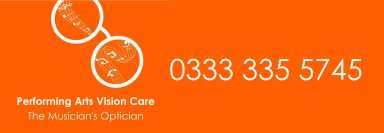





Why Specialist Vision Care Is a Career Investment for Performers
For performers, vision isn’t just a sense—it’s a vital tool of the trade. In fact, around 80% of all information processed by the brain comes through our eyes, while only 10% comes from hearing, 3.5% from smell, 1.5% from touch, and just 1% from taste. When you consider that the vast majority of the brain’s input is visual, it’s clear why
maintaining sharp, comfortable vision is essential—not just for comfort, but for communication, timing, and confidence on stage.
As the years go by, age-related eye conditions can threaten not only your comfort but your ability to do what you love. That’s why investing in specialist vision care isn’t just about seeing better—it’s about protecting your career, your confidence, and your enjoyment of performing.
The Big Three: Presbyopia, Cataracts, and Performance-Related Dry Eyes
The most common vision problem we see in performing artists is presbyopia—the gradual loss of near focusing ability that comes with age. For musicians, actors, and backstage professionals, this makes reading sheet music, scripts, or cues more challenging, especially under variable stage lighting.
Cataracts—clouding of the eye’s natural lens—intensify glare, create halos, and can sap your confidence on stage. Combined with harsh or shifting lighting, cataracts can make even the most experienced performer feel unsteady.
Performance-related dry eyes are another major concern. Long hours under hot, dry stage lights, or working in humid, sweaty environments, can destabilize the tear film, making eyes feel gritty and increasing glare and visual fatigue. This is especially problematic for those already dealing with presbyopia or cataracts.
Other Age-Related Eye Conditions: What Performers Need to Know
While presbyopia, cataracts, and dry eyes are the most frequently encountered, performers over 60 are also at increased risk for other sight-threatening conditions, including:
Glaucoma: Often symptomless in its early stages, glaucoma can cause irreversible vision loss if not detected early.
Age-related macular degeneration (AMD): This can affect central vision, making it hard to see faces, read music, or follow scripts.
Diabetic retinopathy: For performers with diabetes, changes in blood sugar can damage the blood vessels in the retina, leading to vision fluctuations and, in severe cases, permanent loss.
These conditions can be subtle at first, but their impact on
performance can be profound. That’s why regular specialist assessments are so important—not just to keep you performing, but to catch problems before they become career-limiting.
Specialist Solutions: An Investment in Your Future
Mainstream opticians rarely understand the demands of a life on stage.
Our approach is different: we use advanced diagnostics like saccadic eye tracking, VR gaze analysis, and precision colourimetry to tailor
solutions to your unique needs. Custom lenses, filters, and coatings are designed to minimize glare, enhance contrast, and support your
vision through every cue, note, and bow.
### Real-World Impact
We’ve seen clients regain their confidence, extend their careers, and rediscover their love of performing after addressing vision challenges. Small changes—like a new lens tint or a filter—can be the difference between struggling through a show and truly enjoying the experience again.
Looking Ahead
This is just the beginning. In upcoming blogs, we’ll dive deeper into the signs, risks, and solutions for glaucoma, macular degeneration, diabetic retinopathy, and more—empowering you to protect your vision and your career for years to come.
Ready to protect your vision and your career?
Book a specialist consultation today by calling 0333 33 55 745 or 01484 90 70 90.
For performing arts institutions interested in our bespoke vision care workshops, please email contact@performingartsvisioncare.com to
discuss how we can support your team.
